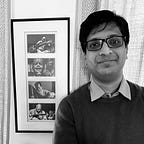Raga of catharsis — Pantuvarali (Kamavardani)/ Kashiramakriya
I have a long-standing grudge against the raga Pantuvarali (also known as Kamavardani). In too many concerts to count, the third piece, or at latest fourth, would be in the ragas Pantuvarali or Poorvikalyani. This was especially true of concerts of mid-late century stalwarts. And I could not get any good answer from anyone on why these two ragas had such a stranglehold on the 2-down position in the line-up. It reminded me of Tendulkar well past his prime, hanging doggedly on. For me, the tragedy was that I did not particularly enjoy either of the ragas. By the time I was done listening to it, I would feel mentally and sometimes physically exhausted, with nothing left in the tank. It felt like someone had pulled the emergency chain just as we were setting off from the station on a long-anticipated holiday. When I could, I skipped over Pantuvarali to the next song.
With age and accommodation, I have reopened my mind to Pantuvarali. A shift in mindset has helped. Instead of clinging to the my first impression of the raga as whiny and exhausting, I began to see it as serving a purpose — of catharsis. I doubt I will ever find it “enjoyable” in an unqualified manner, but I now find it deeply engaging. There is a certain persistence to the raga forces you to dig deep within, so you can have it all out.
There is no better place to start the Pantuvarali journey than with Madurai Somu. He has the same undeniable and authentic “in your face” / “grab you and shake you” energy that I have come to associate with the raga. Here is a recording of his concert at the famous annual Rama Navami concerts organized by the Bangalore Gayana Samaja, in 1979. Surprise, surprise, the third song is Thyagaraja’s Siva Siva Siva Enaraada in Pantuvarali. The song begins at the 15.34 mark and includes an extensive neraval passage.
Thyagaraja composed a dozen or so known compositions in Pantuvarali. Here is an rendition of Vadera Deivamu by T.K. Rangachari. Like Madurai Somu, Rangachari too had a powerful, sometimes gruff voice, which suits the cathartic nature of the raga. As a listener, it is impossible to just coast through this experience, especially once the kriti begins.
Perhaps the artiste most singularly responsible for my shift in perception toward Pantuvarali is Voleti Venkateshwarulu. He is one of my favorite singers, and the raga was a favorite of his. I did not have the heart to skip over the raga, and as a result rediscovered it with an open mind. He also brought in delicately lingering shades of the Hindustani “equivalent” — Pooriya Dhanasri both in the alapana and his rendition of kalpanaswaras. This adds to the sense of undertaking some sort of inner excavation, discovering hidden recesses through the seepage of notes. Here is his rendition of Thyagaraja’s Appa Ramabhakti Ento.
These are just three of Thyagaraja’s compositions in the raga. Some other well known compositions are Raghuvara Nannu, Sambho Mahadeva, Narada Muni Vedalina, Ninne Nera Namminanura and Sundara tara deham. I just looked up the lyrics of the three songs I’ve shared with you. In Siva Siva Siva, he advocates for a simple, virtuous life devoid of distractions and anchored on chanting Shiva’s name. In Vadera Deivamu, he exhorts his mind to recognize that Rama is the only God, an almost militantly monotheist message. Appa Ramabhakti similarly proclaims devotion to ‘father’ Rama to be the ‘best’. He likens the effect of such devotion to the blinkering of a hopelessly wandering mind. Based on this sample of three, I cannot help thinking that Thyagaraja too associated this raga with a sort of mental and emotional catharsis, a need to clear one’s mind and move forward with clarity and fortitude.
In the Venkatamakhin / Dikshitar / Raganga tradition, the raga is known as Kashiramakriya. There is a difference between this version and Pantuvarali / Kamavardani (of the Govinda / Thyagaraja / Melakartha tradition). The latter has all seven notes arranged linearly both in ascent and descent — SRGMPDNS-SNDPMGRS. The notes are the same as that of Mayamalavagowla, except for the M, which is a higher (prati-) madhyama. In Kashiramakriya, there is a vakra (‘crooked’) phrase in the ascent — SGRG-MPDNS. The descent remains the same as in Pantuvarali. Most do not make any distinction between the two. Muthuswami Dikshitar composed seven known compositions in the raga. Perhaps the best known of lot is Ramanatham Bhajeham. Here is M.S. Subbulakshmi’s rendition from a radio concert. Note the introduction by the announcer.
Visalakshi Vishweshim was sung often and well by DK Pattammal, making it popular.
And here is her disciple Vijay Siva singing a less heard, but quite similar composition — Sri Sundararaja Bhajeham. There is a brief tani-avartanam following the song.
When listening to either the three Thyagaraja or three Dikshitar compositions, you would have noticed that the compositions tend to begin in and stay focused on the upper part of the octave. Here is a rarely heard Dikshitar composition that breaks this mould — Uchista Ganapatau. It is no longer the sound of the relentless agitator that wants to force your inner reckoning. It is now the indifferent but definitive sound of fait accompli. It is up to you to listen . At least that’s how it seems to me in this superb rendering by Madurai G.S. Mani. I think it is my new favorite composition in a still not-quite-favourite raga.
Thank you for listening!
